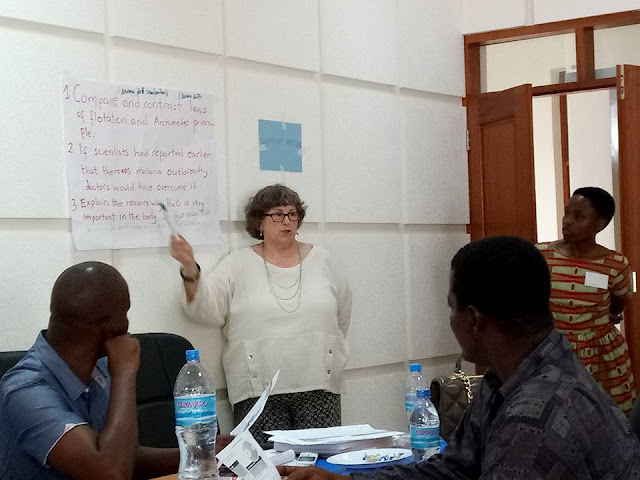Recently, from 4
to 15 December 2017, TELTA in collaboration with the US Embassy and Peace Corps
Tanzania conducted intensive Content Based Instruction training for teachers
from 23 regions of Tanzania.
The first phase of the training was conducted at Sokoine University of Agriculture in Morogoro, where by only English Language teachers participated. The second phase combined both English language teachers, Peace Corps volunteers and their counterparts who teach other subjects. It was done this purposely to make all these teachers work together and see how language is embedded into the content. The main task of the Language teachers was to help other subject teachers showing how they can simplify and use English in their contents.
The objective of the training was to look how language can be integrated into the teaching of the content matters in the classrooms using the same teachers of such subjects. The main discussion was how other subject teachers can incorporate instructional strategies that expose the students to high level academic language needed for success in English medium content that they can transfer to other academic disciplines such as Chemistry, Biology, Physics and Mathematics.
The training was fully facilitated by Prof Ann Snow, the Senior Lecturer from North Carolina University, US. Prof Ann really showed her competency on the theme as her presentations were really reflecting what were being discussed by the participants.
As an approach to foreign language education, Content-Based Instruction (CBI) refers to the integration of language learning as well as content learning. CBI is a totally different method of teaching from traditional foreign language teaching methods in so far as “language proficiency is achieved by shifting the focus of instruction from the learning of language per se to the learning of language through the study of subject matter.
During the whole training, the participants saw the CBI approach as potential to enhance students’ motivation, to accelerate students’ acquisition of language proficiency, to broaden cross-cultural knowledge, and to make the language learning experience more enjoyable and fulfilling. Participants were trained on how to use graphic designs that are helpful in their classrooms, they also learnt other strategies as PQP, Dictocompo and many others to make sure that the concept was really understood.
Considering all the pros and cons, the participants agreed that CBI presents a challenging while rewarding alternative to traditional foreign language approaches. In the long run, CBI is a language teaching method worth the previous commitment to it. From the related projects that the participants are required to organize and implement, some valuable characteristics of CBI are expected to be noticed.
This training is expected to show the changes in teaching of other subjects, as there will be collaboration of teaching language which is embedded by the content.












No comments:
Post a Comment